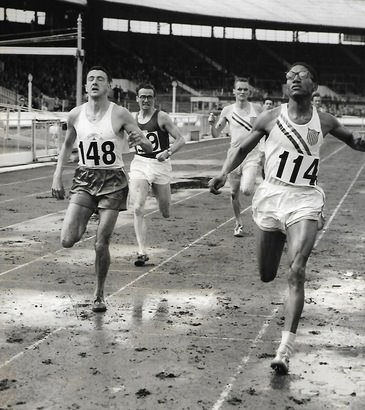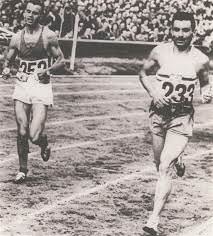Ralph and Rufe, America’s largely forgotten milers of the 1930s A few years ago, while waiting in the quaint and tiny railroad station at Klamath Falls, in the south-east corner of Oregon, for the 8.17 a.m. daily “Coast Starlight” to Portland and Seattle, I fell into interesting conversation with a fellow-traveller who turned out to be the sports editor of the local newspaper. The train, which had started in Los Angeles, was 2¾ hours late in arriving, but I was in no hurry and was all too glad of the opportunity for discussion with my new-found acquaintance to while away the delay. He had known Ralph Hill, the Olympic 5000 metres silver-medallist of 1932 who had died in 1994 at the age of 85, having been brought up and then earned his living on his family’s nearby potato farm.

The Quick-silver Master of the Photo-finishThe Career of a Double Relay World-record-breaker Reggie Pearman was among the finest exponents of the 400 metres/800 metres “double”, but unfortunately for him his career precisely coincided with two of the greatest ever at that particular combination of events. Malvin Whitfield was Olympic champion at 800 metres in 1948 and 1952, with Arthur Wint 2ndon each occasion, and Wint won the 1948 400 metres with Whitfield 3rd. Added to which, both had 4 x 400 metres relay gold. Pearman never won an Olympic medal of any kind, nor even came close, but he did have one achievement to his credit which neither Whitfield nor Wint ever managed – the fastest stage in the process of contributing to World records at both 4 x 440 yards and 4 x 880 yards.
Squire Yarrow: the Upright, Distinguished Squire of the Marathon from London's East End When Squire Yarrow died at the age of 78 in 1984 the obituary writers could naturally have been tempted to describe him as having given a lifetime’s service to athletics. He had represented Great Britain at the marathon both before and after World War II and had continued competing until his mid-40s. He had written authoritatively about road-racing pace and strategy. He had been very widely involved in administration and had been appointed president of the Amateur Athletic Association in 1978, continuing a distinguished line of which Harold Abrahams and the Marquess of Exeter were his immediate predecessors. Yet it still didn’t quite add up to a lifetime of involvement because he had not taken up running until he was 26, and there can be few who have matched his achievements as a runner after so late a start.
Steeplechasing in the 1930s: The American Perspective, and a Technical Development 30 Years Ahead of the Times
19th July 2018
Steeplechasing in the 1930s – the American Perspective, and a Technical Development 30 years Ahead of the Times At the beginning of the 1930s the World's fastest time for the 3000 metres steeplechase was 9:21.8 by Toivo Loukola, of Finland, in winning the 1928 Olympic title. Loukola's fellow-countryman and successor as Olympic champion in 1932 and 1936, Volmari Iso-Hollo, reduced this record to 9:03.8 on the latter occasion in Berlin. Iso-Hollo might well have become the first man to run under nine minutes, had he had the competition to do so and had he been more dedicated to the sport. Contrary to the dour and dedicated demeanour thought typical of the Finns, and personified by Paavo Nurmi, Iso-Hollo was a happy-go-lucky sort of individual.
Sydney Wooderson – Not So Much a Reverence as a Re-evaluation“Sydney Wooderson, A Very British Hero”, by Rob Hadgraft, published by The Book Guild Ltd, 9 Priory Business Park, Wistow Road, Kibworth, Leicestershire LE8 ORX, England, freephone 0800 999 2982, [email protected], ISBN 978 1912575 350, £10.99.Rob Hadgraft has made a lasting contribution to athletics history and literature over the past 15 years with his series of intensely-researched and affectionately written biographies of Alfred Shrubb, Walter George, Louis Bennett (” Deerfoot”), Arthur Newton, Jim Peters and now Sydney Wooderson. Surprisingly, this is the first full biography of one of the very finest of all British athletes, though David Thurlow has written a profusely illustrated booklet and the late Michael Sheridan compiled a descriptive career record.
The 1936 Olympic marathon gold and the mysterious North Korean athletics legacy The emergence of North Korea’s leader on to the international political stage has enormous connotations, and it is really a very minor issue – but interesting, nonetheless – to hope for some clarification of the country’s national records in athletics. According to the Wikipedia website, the women’s records for the five shortest track distances read in sequence 11.80, 25.10, 56.23, 1:58.0, 4:14.76, and there’s an obvious anomaly here. The long-lasting 1:58.0 for 800 metres belongs to Sin Kim Dan, who would have been an immensely tough rival for Ann Packer in the 1964 Olympic 800 metres had she been allowed to run. Furthermore, Sin Kim Dan also did 51.2 for 400 metres four days after Betty Cuthbert had beaten Packer for that year’s Olympic title in 52.0. And yet this equally credible latter performance of Sin Kim Dan’s does not appear in the Wikipedia listing.
Do you want to take part in the Olympics? Well, join the group and you’re in the teamThe curious anomalies of the Athens Games of 1906 There was no selection process for Great Britain’s athletes at the “intercalated” Athens Olympic Games of 1906. If you wanted to compete, regardless of your ability, you merely let England’s Amateur Athletic Association know and no vetting process was applied. When only a dozen or so prospective competitors had been in touch, the AAA even extended an open invitation for others interested in making up a party of 30 who would benefit from a group travel rate by train (2nd Class) and ferry (1st Class) for the round trip to Greece of just under £17 each (more precisely, £16 17s 6d). “Anyone desirous of availing himself of the reduced fare should communicate at once with the hon. sec. AAA” was the published plea. In 2019 financial terms, this is equivalent to about £2000 or 2600 US dollars.

The Defeated Marathon Hero’s Own Memories “I knew I was going to be passed…it was like the progress of a martyr.” One of the most dramatic finishes in Olympic marathon history was that of the 1948 Games when Etienne Gailly, of Belgium, entered Wembley Stadium in the lead but in an exhausted state and was passed by Delfo Cabrera, of Argentina, and Tom Richards, of Great Britain, who took the gold and silver respectively, with Gailly salvaging the bronze. But then perseverance in the face of adversity was clearly a salient characteristic of Gailly’s, as his wartime adventures had shown.
The first Pan-American Games of 1937 Was the Olympic 800 metres champion robbed of a World record ?
2nd November 2017
The First Pan-American Games of 1937: Was the Olympic 800 Metres Champion Robbed of a World Record ?by Bob Phillips The first official Pan-American Games took place in 1951, but there had been a meeting scheduled for 1942 which, like so many other fond plans in the USA, went by the board after the Japanese bombarded Pearl Harbor in December of the previous year. Going back even before then, a Games had been held in 1937, and though it doesn’t figure in the approved records it was of sufficient standard to be well worth remembering.